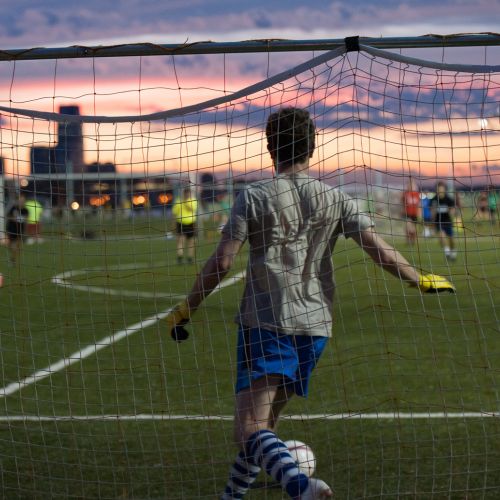What Are Some Tips For Setting Motivating And Realistic Goals As An Athlete?
Setting goals is like drawing a treasure map: you need to plot an inspiring course towards the Holy Grail, without aiming for the unreachable star. For the athlete in pursuit of feats, establishing exciting yet achievable goals is a delicate balancing act. Between sky and earth, between dream and reality, how do you find the right trajectory? Follow this guide that offers some tips to help you structure your ambitions and hit the target with the fervor of a true competitor.
Clarify one's intrinsic aspirations.
Before embarking on setting goals, it is imperative to clearly identify one's inner motivations. What really drives the push to exceed oneself and aim for continuous improvement as advocated by the High Performance Academy? Pinpointing one's deep-seated motivations allows for the formulation of meaningful goals.
Taking the time to analyze what intrinsically motivates is essential. Is the goal to improve physical fitness? Is there a desire to take on challenges? Is there an ambition to participate in competitions? Defining one's core aspirations helps to structure goals around what truly matters.
Once the essential motivations are clarified, it is possible to formulate specific goals. Choosing goals that reflect and nourish one's motivation is recommended. Thus, break down your ultimate goal into specific micro-goals. For example, if there is a desire to excel, aiming to improve personal records may be appropriate.
Similarly, if competition is stimulating, registering for a race or tournament can motivate. Goals aligned with one's aspirations provide the necessary energy to persevere.
Set specific and quantifiable goals.
The key to setting motivating goals is to make them specific and quantifiable.
Vague goals like 'improve fitness' or 'become stronger' should be avoided. It's better to formulate your goals in a concrete and numerical way.
For example: run a 10k in under 45 minutes, bench press 100 kg, do 15 pull-ups, etc. Specific goals allow for objective measurement of progress. This drives one to exceed their limits to achieve tangible results.
For each goal, it is recommended to define clear criteria for success. How much weight do you want to lift? What exact time are you aiming for? What distance or height are you targeting? Setting numerical benchmarks provides milestones to reach.
It then becomes possible to adjust your training pragmatically based on your results. Measurable goals make progress tangible.
It is advisable to write down your goals and action plan in a training log. This helps to stay focused and motivated. Regularly assessing your progress against set goals is useful. If necessary, adjusting your strategy can help you continue to make effective progress.
Choose realistic deadlines
While aiming for ambitious goals that stretch one's limits, it is essential to establish realistic deadlines.
If the set deadlines are unrealistic, discouragement can quickly set in. For example, don't give yourself just 3 months to run a marathon if you have never run more than 5 km before. To define motivating yet achievable deadlines, it is advisable to base them on your current level and estimate the necessary time to achieve the desired goal.
Taking into account the time required to gradually develop one's skills and endurance is crucial. Seeking the advice of a coach to establish a credible timetable is a good idea.
Breaking down long-term goals into short-term sub-goals can be a winning strategy. For a marathon in a year's time, for instance, one could set milestones like running 10 km in 3 months, 15 km in 6 months, 20 km in 9 months.
These intermediate steps make the overall deadline more realistic. Most importantly, they allow for regular celebration of small victories that fuel motivation.
Demonstrate flexibility.
It is recommended to be flexible and adjust your goals over time.
If progress is faster than expected, do not hesitate to revise your ambitions upward and aim higher.
Conversely, if a goal proves too difficult, reevaluate the timeline or formulate a more realistic objective. The key is to maintain motivation by setting ambitious, yet achievable challenges.
It is important to always focus on long-term progression rather than immediate results.
Do not get discouraged continuously. Simply adjust your goals so they remain challenging, but motivating. With patience and perseverance, progress will come.
To obtain the support of one's peers.
Surrounding yourself with kind and encouraging people also helps maintain motivation and achieve your goals. Sharing your aims with loved ones and training partners allows them to support you in your efforts. Do not hesitate to ask them for positive and constructive feedback on your progress.
You can also join a community or sports club that shares your passion. Interacting with peers who understand your challenges and aspirations provides valuable motivation. Train together, set common goals, share your successes. The support of a group experiencing the same things can push you to excel.
Receiving encouragement from your social circle and sports community fuels the determination to give your best. Their kindness and advice will help you through tough times when motivation wanes. You will also take great pride in sharing the achievement of your goals with them.
In summary, to aim for sporting excellence, it is recommended to establish inspiring and pragmatic goals. Start by clarifying your deep motivations. Then, formulate specific and measurable objectives. Set realistic deadlines by breaking down long-term goals. Finally, be flexible by adjusting your ambitions as you progress. This approach keeps motivation high for surpassing oneself.
Here are some tips that work if you want to stay motivated to reach your goals and achieve sporting feats.








